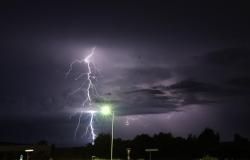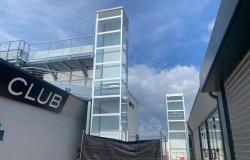The Israeli army bombarded the Gaza Strip on Friday as exchanges of fire with Hezbollah on Israel’s northern border with Lebanon and threats brandished by both camps raised fears of an extension of the war.
Israeli bombings targeted the besieged Palestinian territory early Friday, where the war between Israel and Hamas was triggered on October 7 by a bloody attack by the Islamist movement on Israeli soil.
This conflict, which left tens of thousands dead in the Gaza Strip, caused an outbreak of violence on the Israeli-Lebanese border, where exchanges of fire between the army and the Lebanese Hezbollah, an Islamist movement allied with Hamas, have intensified recently.
During the night, the army said it had intercepted an “aerial target” launched from Lebanon and media reports reported Israeli strikes on southern Lebanon.
In Washington, the Israeli National Security Advisor, Tzachi Hanegbi, and the Israeli Minister of Strategic Affairs, Ron Dermer, spoke with the head of diplomacy Antony Blinken, at a time when relations are straining between the White House and Israeli Prime Minister Benjamin Netanyahu.
– A war for the “existence” of Israel –
During this interview, the Secretary of State “reiterated the United States’ unwavering commitment to Israel’s security,” according to his spokesperson Matthew Miller.
He also underlined “the importance of avoiding a new escalation in Lebanon” through a “diplomatic solution allowing Israeli and Lebanese families”, displaced by the exchanges of fire, “to return home”, added Mr. Miller.
Mr. Netanyahu said Thursday that Israel was waging “a war for its existence” and that his country needed weapons from the United States, its historic ally, after deploring delays in American military aid on Tuesday.
“No other country is doing more to help Israel defend itself against the threat of Hamas,” responded National Security Council spokesman John Kirby.
In an incendiary speech on Wednesday, Hezbollah leader Hassan Nasrallah warned that “no place” in Israel would be spared by his movement’s missiles in the event of an Israeli attack on Lebanon.
The day before, the Israeli army had announced that “operational plans for an offensive in Lebanon” had been “validated”. The head of diplomacy, Israel Katz, had threatened a “total war” in which Hezbollah would be “destroyed”.
Mr Nasrallah also threatened Cyprus, the European Union country closest to the coast of the Middle East, saying he “has information” according to which Israel could use “airports and bases” if attacked. Cypriots.
These accusations are “unfounded”, reacted the Cypriot government.
– “We are tired” –
As in Israel, these threats have caused concern in Lebanon, where Hezbollah, armed and financed by Iran, exercises a preponderant influence.
“Lebanon does not want a war. We are tired, there is the economic situation, and on top of that a war. We cannot continue like this,” said Sofinar, a resident of Beirut.
“We don’t know if this story will end in a war or an agreement. I would prefer an agreement,” said Shimon Kamari, a resident of Kiryat Shmona, in northern Israel.
“It is crucial that all parties stop shooting,” said the UN special coordinator for Lebanon, Jeanine Hennis-Plasschaert.
The war in Gaza broke out on October 7, when Hamas commandos carried out an attack in southern Israel that resulted in the deaths of 1,194 people, mostly civilians, according to an AFP count established from official Israeli data.
Of 251 people kidnapped that day, 116 are still being held in Gaza, 41 of whom are dead, according to the army.
In response, Israel promised to destroy Hamas, in power in Gaza since 2007 and which it considers a terrorist organization, as do the United States and the European Union. His army launched an offensive that has so far killed 37,431 people, mostly civilians, according to data from the Health Ministry of the Hamas-led Gaza government.
The Israeli army announced on Friday the death of two soldiers in combat in the central Gaza Strip, bringing to more than 310 the number of soldiers killed since the start of ground operations on October 27.
On Friday, bombings and tank and artillery fire targeted the town of Rafah, in the south, as well as several sectors in the north and center of the territory, including the Nousseirat camp and the surroundings of Deir el-Balah
Civil Defense spokesman Mahmoud Basal said “five bodies of municipal workers were found under the rubble” of a bombed municipal building in the center of northern Gaza City. Tank fire also targeted the Zeitoun district, according to an AFP correspondent.
The army said ground fighting continued in the Rafah sector, where “several terrorists were eliminated.”
A launch site installed in an area housing displaced people near Khan Younes “was targeted by an airstrike” on Thursday evening, the army added, stressing that “several measures had been taken to limit the damage caused to civilians”.
“We will not leave Gaza before the hostages have all returned and before eliminating the military capabilities of Hamas,” Benjamin Netanyahu reaffirmed Thursday, while a new demonstration bringing together Israelis hostile to his conduct of the war took place. place in Jerusalem.





